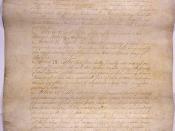The Creation of the Constitution
To amend is "1. To improve; better. 2. To remove the faults or errors of; correct; rectify. 3. To alter formally by adding, deleting, or rephrasing." This is exactly what the delegates to the Constitutional Convention had in mind when they arrived in Philadelphia in May of 1787 - to amend the Articles of Confederation. They had come to "remedy the perceived weaknesses of the Articles of Confederation." But in reality that is the exact opposite of what happened. They in fact drafted up a whole new constitution. The Articles of Confederation had a profound effect on the making of the United States Constitution. There were many opposing plans and conflicting views of the delegates to the Constitutional Convention. It was these plans and views which ultimately led to the creation of the Constitution of the United States of America.
The Articles of Confederation was the first Constitution of the independent United States of America.
It was instituted before the Revolutionary War was even won, and was in force since 1781. Whether or not to accept the Articles was a very controversial issue, "as witnessed by the drawn-out ratification dates." Many of the people feared a strong central government, fearing that it would become tyrannical. The Articles of Confederation "created a federation in which the individual State powers ruled supreme, at the expense of a strong national government." But the Articles of Confederation had its weak points. It had no cohesive power, and was unable "to regulate abuses among the States." It had insufficient power to control commerce. It couldn't tax, and was generally powerless in setting commercial policy. Also, it could not effectively support a war effort, and the states were in an economic disaster. There was high inflation and a lot of...



"The Creation of the U.S. Constitution"
Well-written, and very well detailed. Interesting to read despite the length. I enjoyed reading it.
6 out of 6 people found this comment useful.